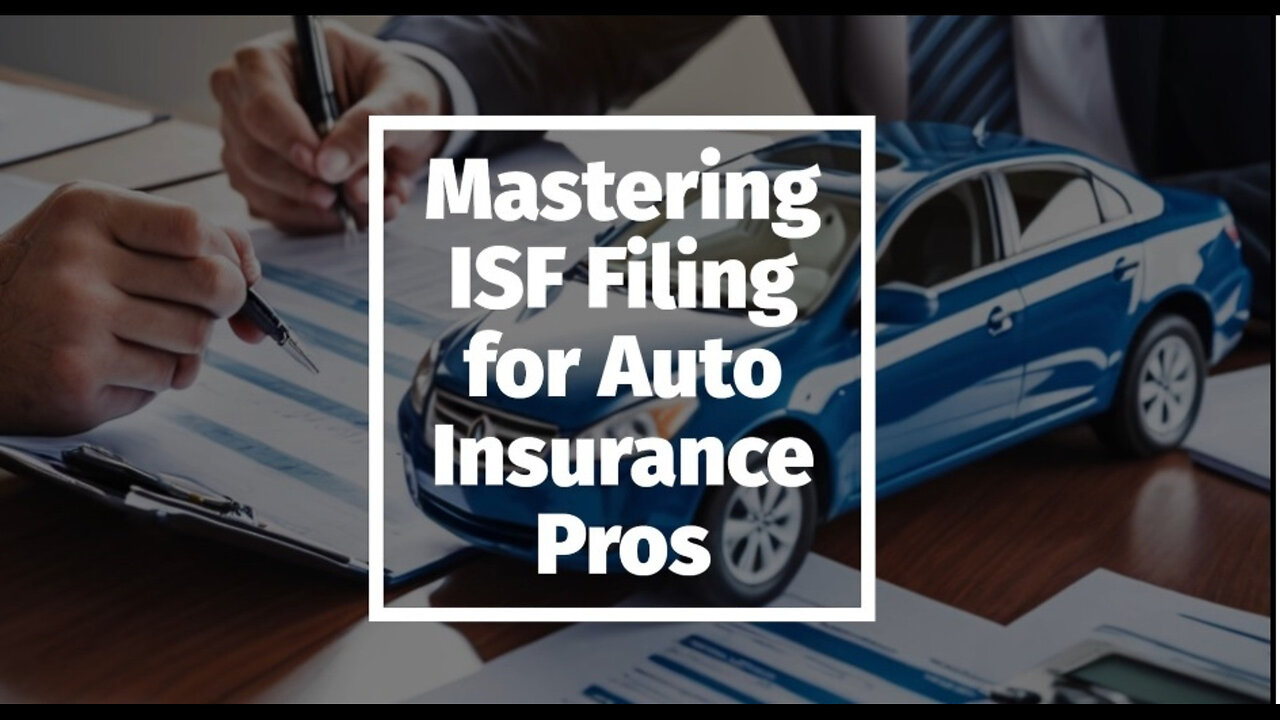Premium Only Content

Mastering ISF Filing: A Must-Know Guide for Automotive Insurance Providers
US Customs Clearing | 213-270-1930 | info@uscustomsclearing.com | https://uscustomsclearing.com/
Welcome back to our channel, where we explore everything related to customs brokerage and international trade. In today's episode, we'll be diving deep into the topic of Importer Security Filing, or ISF, specifically for automotive insurance providers.
First, let's touch upon the basics. Importer Security Filing, commonly known as ISF, is a requirement by US Customs and Border Protection (CBP) for all ocean shipments entering the United States. This filing must be done by the importer or their authorized agent, such as a licensed customs broker, to provide essential information about the cargo being imported.
Now, you might wonder, why is this relevant to automotive insurance providers? Well, automotive insurance providers often have a vested interest in the imported vehicles. They need to ensure the safety and insurability of these vehicles before they hit the roads. By having access to accurate information through ISF filing, insurance providers can better assess the risk involved, determine appropriate premiums, and protect their financial interests.
Now, let's dive into the key details that automotive insurance providers should pay attention to when it comes to ISF filing. One crucial aspect is providing accurate and timely information. The ISF filing must be submitted to CBP no later than 24 hours before the cargo is loaded onto the vessel overseas. Failure to meet this requirement may result in penalties or even delays in receiving the cargo.
Another important consideration is ensuring the completeness of the ISF filing. Automotive insurance providers need to collaborate closely with their customs broker to gather detailed information about the imported vehicles, including the vehicle identification number (VIN), make, model, year, and the shipper's information. This data allows insurance providers to assess the value, condition, and safety of the vehicles.
Additionally, automotive insurance providers should also be aware of the ISF bond requirement. An ISF bond serves as a financial guarantee to CBP, ensuring compliance with the ISF filing regulations. This bond can be obtained through a customs broker, providing assurance that the importer will fulfill their obligations regarding ISF filing. Having a reliable customs broker with expertise in ISF filing is crucial in securing this bond.
It's worth mentioning that automotive insurance providers should also consider working with a customs broker who offers comprehensive customs brokerage services. A trusted broker can not only handle the ISF filing process but also provide guidance on other customs-related aspects such as duty rates, customs classifications, and regulatory compliance.
By ensuring smooth ISF filing and customs brokerage processes, automotive insurance providers can streamline their import operations, reduce risk, and enhance their overall business efficiency. The accuracy and timeliness of ISF filing contribute to a successful supply chain and foster trust among stakeholders.
That wraps up our deep dive into ISF filing for automotive insurance providers. We hope you now have a better understanding of the importance and relevance of ISF filing in the automotive insurance industry. As always, stay tuned for more informative videos where we explore various aspects of customs brokerage and international trade. Thank you for watching, and we look forward to having you join us again soon!
#usimportbond #isfcustomsbroker #uscustomsclearing #isfentry
Video Disclaimer Here: For learning purposes only, We claim no affiliation with any US government agency.
00:35 - Importer Security Filing (ISF) is a requirement by U.S. Customs and Border Protection for all ocean shipments entering the United States, and it is important for automotive insurance providers to understand its significance.
1:05 - ISF filing provides essential information about imported vehicles, allowing insurance providers to assess risk, determine premiums, and protect their financial interests.
1:29 - Automotive insurance providers should ensure accurate and timely ISF filing, collaborate closely with customs brokers to gather detailed information about imported vehicles, and be aware of the ISF bond requirement.
1:56 - Working with a customs broker who offers comprehensive customs brokerage services can help streamline import operations, reduce risk, and enhance overall business efficiency for automotive insurance providers.
-
 13:42
13:42
China Uncensored
12 hours agoChina's Invasion Has Begun
7.22K15 -
 LIVE
LIVE
Wendy Bell Radio
6 hours agoBUSTED
8,585 watching -
 LIVE
LIVE
JuicyJohns
2 hours ago $0.90 earned🟢#1 REBIRTH PLAYER 10.2+ KD🟢$500 GIVEAWAY SATURDAY!
102 watching -
 LIVE
LIVE
LFA TV
14 hours agoLFA TV ALL DAY STREAM - FRIDAY 8/1/25
4,168 watching -
 4:02:39
4:02:39
The Bubba Army
1 day agoHulk Hogan had Leukemia? - Bubba the Love Sponge® Show | 8/01/25
84.4K3 -
 18:36
18:36
DeVory Darkins
10 hours ago $6.83 earnedTrump scores MAJOR WIN with Americas youth as Biden drops HORRIBLE speech
29.5K40 -
 14:13
14:13
Clickbait Wasteland
16 hours ago $5.70 earnedAsking New Yorkers Who they Support for Mayor: Harlem
49.3K35 -
 19:55
19:55
The Rad Factory
17 hours ago $2.88 earnedCan I Fix My Fire Damaged F1 Car?
33.8K4 -
 1:26:22
1:26:22
Dialogue works
2 days ago $1.65 earnedScott Ritter: Russia Just DEFIED the U.S.: We'll End the War on OUR Terms!
17.6K11 -
 2:00:40
2:00:40
BEK TV
1 day agoTrent Loos in the Morning - 8/01/2025
26.6K1